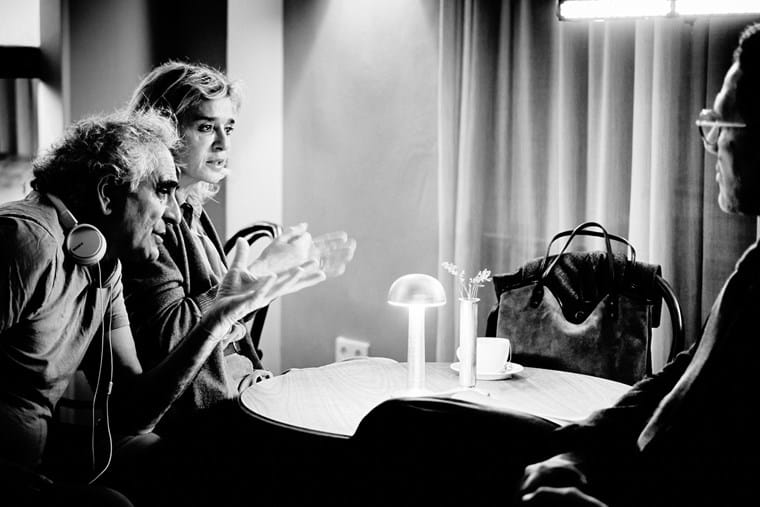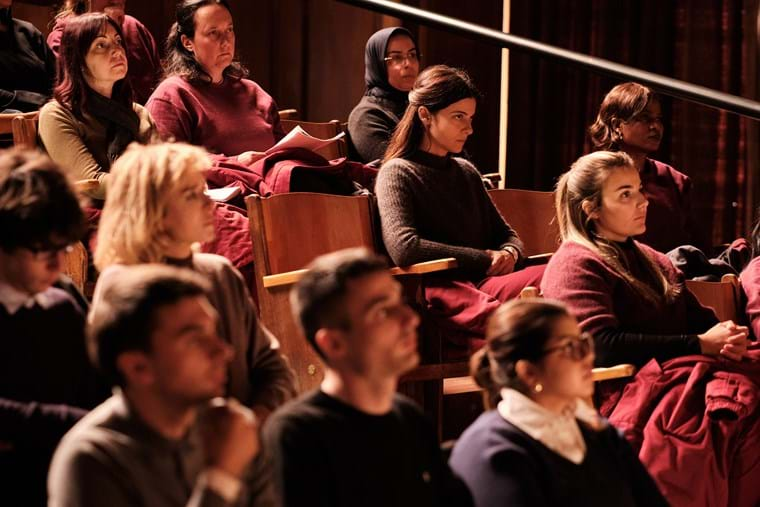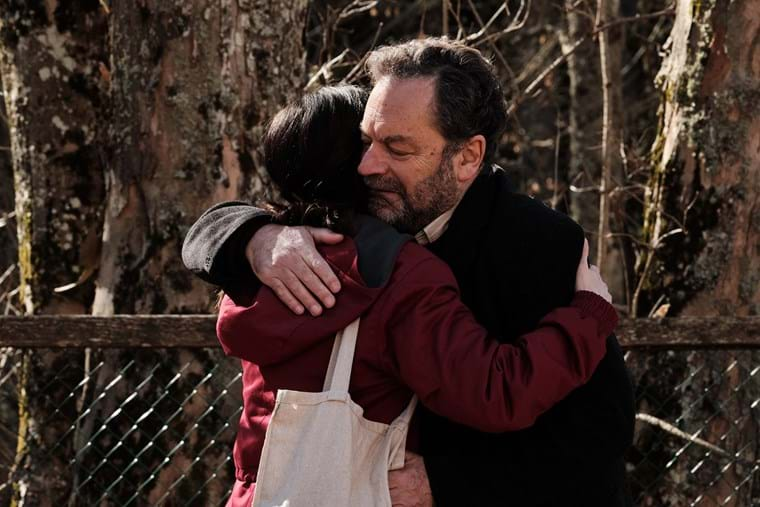Spring is in the air. Traditional folk songs can be heard from an abandoned hotel in the woods. But behind this deceptively idyllic scene lurks a devastating truth. TAKE visited the set of Elisa, the latest film by Leonardo Di Costanzo. The production of this film is supported by the IDM Film Commission Südtirol.
In a hall remodelled into a chapel, a dozen women begin to sing a traditional song. They are all wearing the same uniform: black shirt, red trousers. One of these women is Elisa (Barbara Ronchi). When she gets to the lyric “Diventa rossa la moretina per la vergogna del grande amor” (“The brown-haired girl blushes with shame of the great love”), Elisa freezes. Her gaze wanders off as if some excruciating pain suddenly seized her. Elisa is not just an ordinary choir singer. She is a prisoner, having been convicted of her sister’s murder. Now she is serving her sentence at the Istituto Moncaldo, a prison focussing on rehabilitation rather than punishment. She is accompanied by the criminologist Alaoui (Roschdy Zem), who is researching crime against family with a therapeutic, not a punitive approach: rather than judge, he is looking to understand.
“South Tyrol has a lot to offer as a film location, including all the local experts.”
The many facets of the human psyche
“As she is singing, Elisa has an epiphany that will reveal a dramatic truth”, says Carlo Cresto-Dina, producer at the Rome-based Tempesta Film, describing this scene. There is no clear indication as to the time period in which the film takes place. This was done on purpose to create an atmosphere of time standing still, not giving any misleading hints. The story does not intend to downplay the severity of the crime and associated guilt nor to relegate the victim to the background. Instead, it is looking to explore the complexity of the human soul. “If you want to understand evil, you’ve got to look it in the eye”, Cresto-Dina emphasizes. This complex, ambitious tale was penned with sensitivity by writer and director Leonardo Di Costanzo. In all his works, he examines the human psyche and all its facets, steering clear of tropes and stereotypes. Di Costanzo and Cresto-Dina have worked together since 2011. It is not the first time that Cresto-Dina visits South Tyrol/Südtirol as part of a production. He has been well acquainted with the region ever since he shot the film Fräulein – Una Fiaba d’Inverno (“Fräulein – A Winter’s Tale”) on the Ritten mountain in 2014. “South Tyrol has a lot to offer as a film location, including all the local experts”, the producer explains.

A film set in the mountains
Caterina Ferrari works on the set as an assistant director. As such, she knows everything about the actors: from their dietary requirements to their make-up and wardrobe schedules. She also prints out the scenes that are scheduled to be shot during a given day of shooting for the crew so they all know what to expect. Originally from Piedmont, Ferrari had lived in Venice and Milan before ending up in Bolzano/Bozen at the ZeLIG School for Documentary, Television and New Media. From there, she went on to serve on set in a number of capacities, from assistant casting director to extras coordinator.

“South Tyrol offers so many perfect locations”, she remembers, waxing enthusiastic. She also lets us in on a secret: the extras in the choir are not just extras, they are real choir singers from the area. She is scheduled to travel on to Switzerland with the production of Elisa but has to leave the set one day early: “My short film is being shown at the Bolzano Film Festival”, she explains. Then she takes her leave. Caterina is one of 30 local professionals working on set. Some others include her male counterpart, assistant director Davide Grotta, as well as location manager Giuseppe Zampella, assistant set dresser Sara Pergher, and lighting technician Kristian De Martis.
“I’m from Bolzano, I live in Berlin, and I’d love to come back someday. Until then, I’ll be sure to make contacts here.”
Monitor B, next to Di Costanzo: Christian Passeri, a Bolzano native, is on the job as first camera assistant. He is filming Elisa as she sings, falters, then stops, capturing a close-up of her face expressing growing discomfort. “I started on 1 March, and I was in charge of all the shooting in South Tyrol. It’s just too bad that I can’t shoot in Switzerland, too”, he says as he wraps up for the day. “The shoot today with the choir scenes wasn’t much of a challenge for me. Other scenes were much more complicated, with a lot more happening”, adds Passeri and continues, “That was a very pleasant experience for me.” He particularly appreciates being able to work on Elisa with Director of Photography Luca Bigazzi, whose work he admires. “I’m from Bolzano, I live in Berlin, and I’d love to come back someday. Until then, I’ll be sure to make contacts here. And who knows, perhaps one day there will be big film studios in South Tyrol, too, run by locals.”
Vans begin to arrive at the courtyard, and the camera operators pack their equipment for loading. Someone takes a selfie for the memories, someone else is humming La moretina. And so, even though everybody is exhausted and getting ready to leave, the day ends on a somewhat cheerful note.
